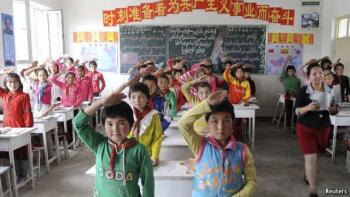UHRP Alarmed by Ban of Uyghur Language in Hotan Schools

For Immediate Release
August 10, 2017 11:05 am EST
Contact: Uyghur Human Rights Project +1 (202) 478 1920
The Hotan Prefecture Department of Education Department issued a directive in June requiring full instruction in Mandarin beginning in preschool, and banning the use of Uyghur in all educational activities and management, threatening punishment if the directive is not followed.
These measures are the most restrictive language policies in the regional education system to date and indicates the policy to move all Uyghur children into the “bilingual” education system is accelerating. Despite its name, “bilingual” education is effectively monolingual through its provision of classes in the Mandarin language. The program undermines key parts of the Uyghur people’s cultural distinctiveness and facilitates the assimilation of Uyghurs into Han culture.
UHRP is alarmed that this marginalization of the Uyghur language will lead to the end of formal education for Uyghur students in their own language.
The Hotan directive is particularly strong; it bans the use of Uyghur in educational and public activities, as well as school administration. Furthermore, it bans the use of Uyghur-only signage.
Hotan is not the only region where the “bilingual” system’s reach is increasing. In an article published on June 23, 2017, official news service Tianshan reported that the regional education department is increasing the use of the bilingual education system down to the kindergarten level in rural areas across East Turkestan. In addition, a large recruitment drive for Chinese speaking teachers was underway.
China has laws protecting the use of minority languages, including in the education system. Article 4 of the Chinese constitution protects the freedom of minorities to use their own language, and Article 37 of the Regional Ethnic Autonomy Law states that schools in autonomous regions should use the ethnic language as the primary medium of instruction.
International human rights instruments also outline standards on ethnic minority rights to receive an education in their own language. These include Article 29 of the Convention on the Rights of the Child, Article 4 of the Declaration on the Rights of Persons Belonging to National or Ethnic, Religious and Linguistic Minorities, and Article 6 of the Universal Declaration of Human Rights.
“Bilingual” education has been steadily expanding; the ten year plan released after the Xinjiang Work Forum in 2010 set a goal of having all Uyghur students speak Mandarin by 2020. The plan explicitly describes bilingual education as assimilative by “promoting cohesion and centripetal force toward the Chinese nation.” To help achieve this goal the regional Department of Education intends to have 85% of pre-schoolers enrolled in three years of bilingual kindergarten by 2020, according to state media reports.
In the 1990s only the “modern” subjects of math and science were taught in Chinese, but Chinese language instruction in the “bilingual” education system has expanded to the point where only a single language and literature class is taught in Uyghur, with all other subjects in Chinese. Teachers in “bilingual” schools are often required to be fluent in Chinese, while Chinese-speaking teachers are not required to speak Uyghur. Many Uyghur speaking teachers have been laid off due to Chinese language mandates. In recent years many job openings for teachers have been reserved for Han applicants and the rapid expansion of Chinese language instruction has resulted in a shortfall of qualified teachers.
“The bilingual education policy is bilingual in name only,” said Omer Kanat, UHRP Director in a statement. “In reality it serves as a tool to accelerate Uyghur assimilation and the marginalization of traditional Uyghur culture.”
The Chinese government is increasing its control over what Uyghurs are able to learn from kindergarten to college. This control not only extends over the education system within East Turkestan, but also abroad. Beginning in April of this year, Uyghur students seeking higher education abroad have been recalled to their hometowns for political assessment and education. Some of them have been detained and imprisoned.
“The government should realize that its efforts to undermine important facets of Uyghur identity will not solve the underlying issues of marginalization and inequality,” Mr. Kanat added. “The Chinese government should respect both its own laws and the principles of international law protecting the right for minorities to educate their children in their own language.”
See also:
Uyghur Voices on Education: China’s Assimialtive ‘Bilingual Education’ Policy in East Turkestan
http://docs.uyghuramerican.org/pdf/Uyghur-Voices-on-Education.pdf
